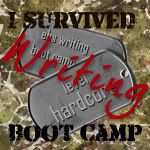On DailyWritingTips.com I've found an useful article about 34 Writing Tips That Will Make You a Better Writer (by Daniel Scocco, http://www.dailywritingtips.com/34-writing-tips-that-will-make-you-a-better-writer).
Here's a selection of tips I've actually applied (or that I'm trying to learn).
Why don't you share your experience?
1. Daniel
Pay attention to punctuation, especially to the correct use of commas and periods. These two punctuation marks regulate the flow of your thoughts, and they can make your text confusing even if the words are clear.
Pay attention to punctuation, especially to the correct use of commas and periods. These two punctuation marks regulate the flow of your thoughts, and they can make your text confusing even if the words are clear.
I recommend services such as Project Team Beta, Emergency Beta Service, or Sparkly Red Pen. Don't miss the opportunity to get a great beta reader!
3. Bill Harper
Try not to edit while you’re creating your first draft. Creating and editing are two separate processes using different sides of the brain, and if you try doing both at once you’ll lose. Make a deal with your internal editor that it will get the chance to rip your piece to shreds; it will just need to wait some time.
Try not to edit while you’re creating your first draft. Creating and editing are two separate processes using different sides of the brain, and if you try doing both at once you’ll lose. Make a deal with your internal editor that it will get the chance to rip your piece to shreds; it will just need to wait some time.
A really nice trick is to switch off your monitor when you’re typing. You can’t edit what you can’t see.
I've learnt the importance of this tip through the Emergency Beta Service Writing Boot Camps. A wonderful experience to unleash your creativity.
4. Jacinta
In a sentence: write daily for 30 minutes minimum! It’s easy to notice the difference in a short time. Suddenly, ideas come to you and you think of other things to write. You experiment with styles and voices and words and the language becomes more familiar…
In a sentence: write daily for 30 minutes minimum! It’s easy to notice the difference in a short time. Suddenly, ideas come to you and you think of other things to write. You experiment with styles and voices and words and the language becomes more familiar…
I agree. If you try an EBS Writing Boot Camp, you'll write for 50 exciting minutes.
6. Pete Bollini
I sometimes write out 8 to 10 pages from the book of my favorite writer… in longhand. This helps me to get started and swing into the style I wish to write in.
I sometimes write out 8 to 10 pages from the book of my favorite writer… in longhand. This helps me to get started and swing into the style I wish to write in.
I don't write out pages from my favorite books, but I do reread a chapter (or two) before starting a writing session. That leads us to the following tip:
7. Nilima Bhadbhade
Be a good reader first.
Be a good reader first.
9. Kukusha
Learn to take criticism and seek it out at every opportunity. Don’t get upset even if you think the criticism is harsh, don’t be offended even if you think it’s wrong, and always thank those who take the time to offer it.
Learn to take criticism and seek it out at every opportunity. Don’t get upset even if you think the criticism is harsh, don’t be offended even if you think it’s wrong, and always thank those who take the time to offer it.
This is what reviews are for. I firmly believe in constructive criticism. Reviews aren't meant only for praise.
17. John Ireland
I set my writing aside and edit a day or two later with the aim of making it terse. It has trained me to be more conscious of brevity when writing for immediate distribution.
I set my writing aside and edit a day or two later with the aim of making it terse. It has trained me to be more conscious of brevity when writing for immediate distribution.
I've noticed it helps -- it's difficult for people who, like me, aren't very patient; but sometimes those two or three days of delay before editing can actually improve an entire chapter.
22. Julie Martinenza
Instead of adding tags (he said/she said) to every bit of dialogue, learn to identify the speaker by showing him/her in action. Example: “Pass that sweet-smelling turkey this way.” With knife in one hand and fork in the other, Sam looked eager to pounce.
Instead of adding tags (he said/she said) to every bit of dialogue, learn to identify the speaker by showing him/her in action. Example: “Pass that sweet-smelling turkey this way.” With knife in one hand and fork in the other, Sam looked eager to pounce.
This is a precious advice. I wish I could apply it more. Here's a trick to understand if a writer is applying this tip. Read the chapter and then try to answer the following questions: what else have you learnt about the characters beside their words? What are they doing? Can you describe their look?...
34. Pedro
Edit your older articles and pieces. You will notice that great part of it will be crap, and it will allow you to refine your style and avoid mistakes that you used to make.
Edit your older articles and pieces. You will notice that great part of it will be crap, and it will allow you to refine your style and avoid mistakes that you used to make.
I don't have the courage to look at my old, ancient old pieces :) Yet.
Your comments are welcome!
- Raum



























good post raum
ReplyDeleteThanks for your comment! I'm glad you liked the post!
Delete- Raum